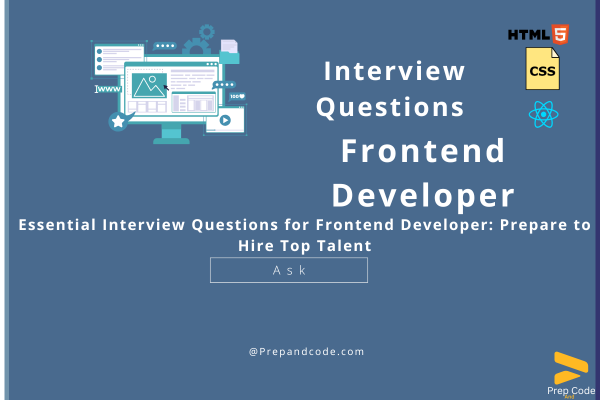Essential Interview Questions for Frontend Developer: Prepare to Hire Top Talent

Finding a skilled frontend developer can feel like searching for a needle in a haystack. You need someone who’s not only good with code but also fits well into your team. Asking the right questions during interviews helps you uncover real talent. Given how fast frontend tech changes, a thorough interview process is more important than ever.
The demand for frontend developers is skyrocketing. According to recent reports, the growth rate of hiring frontend specialists outpaces many other tech roles. But with this surge comes a challenge: how do you accurately evaluate candidates’ skills and cultural fit? The key is to ask clever, targeted questions that reveal both technical prowess and soft skills.
Understanding the Candidate’s Frontend Development Skills
Key Technical Skills to Assess
When interviewing frontend developers, start with the basics. Are they comfortable with HTML, CSS, and JavaScript? These are the building blocks of any website. Then, see if they’re familiar with popular frameworks like React, Angular, or Vue.js, which power modern web apps.
Don’t forget to ask about their experience with creating pages that look good on all devices — responsive design. Can they make sure websites work on different browsers? In real projects, these skills matter just as much as passing technical quizzes.
Evaluating Problem-Solving Abilities
A good frontend developer doesn’t just write code — they solve problems. Give coding exercises that mimic real challenges, like fixing layout bugs or optimizing load times.
You could ask, “How would you improve website performance?” or “Describe how you’d troubleshoot a slow-loading page.” Watching how they debug issues reveals much about their skill. Candidates who can quickly identify issues like broken layouts or sluggish scripts show they understand the job.
Assessing Knowledge of Web Performance Optimization
Performance matters for user experience. Ask questions about image compression, lazy loading, or code splitting.
How do they measure success? Candidates should mention tools like Lighthouse or PageSpeed Insights.
Look for those who know the importance of fast-loading pages, especially since users will likely abandon slow sites. Choosing someone who prioritizes speed shows they value user satisfaction.
Testing Knowledge of Frontend Frameworks and Libraries
Popular Frameworks and Their Core Concepts
Every popular frontend framework has its own language.
React developers should understand component lifecycle, hooks, and state management.
Angular experts need to know dependency injection, modules, and directives.
Vue.js fans should be familiar with reactivity systems, directives, and Vuex for state handling.
Ask tailored questions based on your current tech stack. If your project uses React, focus on hooks and components.
Practical Framework Application
Pure theory only gets you so far. Ask candidates to build or describe how they’d create a specific feature.
For example, how would they design a dynamic form or a real-time chat widget?
See if they can manage complex data flow and state.
Watching them translate theory into code helps you gauge their practical skills and problem-solving ability.
Version Control and Collaboration Tools
No developer works alone. Experience with Git, GitHub, or GitLab is crucial.
How do they handle merge conflicts or review pull requests?
Candidates should demonstrate they understand team collaboration workflows.
Good command over version control tools indicates they can fit into your team smoothly.
Frontend Development Best Practices and Coding Standards
Code Quality and Maintainability
Ask about their approach to writing clean and reusable code.
Do they follow style guides or use linting tools?
Code should be modular, so others can understand and update it easily.
Prioritize candidates who value maintainability — it saves time in the long run.
Accessibility and Inclusive Design
Web accessibility isn’t optional anymore. Ask if they understand ARIA roles or keyboard navigation.
Can they build components that work well for screen readers?
A developer committed to inclusive design reaches a broader audience and makes your product better for everyone.
Testing and Quality Assurance
Testing is the backbone of reliable web apps.
Are they familiar with tools like Jest, Mocha, or Cypress?
Can they write unit tests or conduct integration testing?
Candidates who prioritize testing demonstrate they care about quality and long-term stability.
Soft Skills and Cultural Fit
Communication and Teamwork
Technical skills matter, but soft skills matter more. Have they worked closely with designers or back-end developers?
Notice how clearly they explain complex concepts.
Good team players share ideas openly and listen well.
Problem-Solving Attitude and Adaptability
The tech field is always changing. Ask how they handle deadlines or changing project requirements.
Do they stay current by learning new tools or trends?
A flexible candidate will adapt better to your evolving needs.
Project Management and Time Estimation
Experience with Agile or Scrum can be valuable.
Can they break down tasks and give realistic time estimates?
Such skills ensure they can meet deadlines without stress or confusion.
Practical Coding and Portfolio Review
Live Coding Tests
Simulate real work with timed coding challenges.
Focus on code clarity and logic, rather than trying to be overly tricky.
Observe how they write under pressure, and see if their style is clean and efficient.
Portfolio and Past Projects
Always review their portfolio.
Look for personal websites, open-source contributions, or previous client work.
Choose projects that show both skill and passion.
A strong portfolio indicates real-world experience and dedication.
Conclusion
Thorough interview questions are your best tool for finding talented frontend developers. Combine technical queries with soft skills assessments to see the full picture. Keep your questions updated, so they reflect the latest tech trends and user needs. Remember, a great hire isn’t just about skills — it’s about how well they fit into your team and vision. Use these strategies to unlock top talent and build stronger, more innovative web experiences.